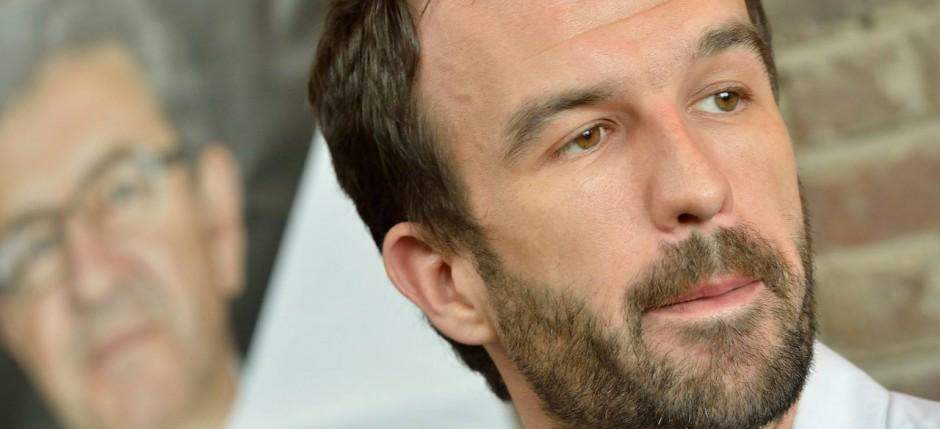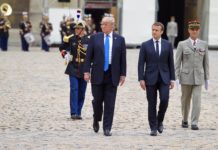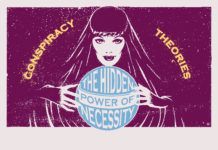Manuel Bompard was the communications manager for Jean-Luc Mélenchon, the French left-wing populist candidate who received 20% of the vote in the April 2017 French Presidential Elections. In this interview Bompard reflects on the recent evolution of the French left from the margins of French politics to the heart of the French people. This interview was first published by our French partner Le Vent se Lève (LVSL). Translation by Paul Malgrati.
LVSL: Manuel, you are 31 years old, you belong to a generation that mastered the codes of the internet which are now at the heart of the strategy of La France Insoumise [‘Unbowed France”‘ – the name of Mélenchon’s movement]. Did the 2017 campaign mark a turning point in the political uses of the internet?
I am not sure that we could speak of a turning point. Actually, things went down more smoothly than that. There were several steps between our first campaign in 2012 and that of 2017. There was no straightforward way to go from one style of campaigning to the other. There were many experiments in between the two campaigns – the Mouvement pour la 6ème République [M6R – Movement for a 6th Republic created in 2014] is one example of that. With the M6R, we stressed the importance of social media. We created a digital platform which aimed to replace the traditional role of political organisations.
Today, the online platform of France Insoumise enables people to do what political parties traditionally did, such as ordering equipment, organising with other people, etc. It directs our activities in a way that isn’t as rigid as that of other political organisations. This helps us create porosity between our movement and society. The dead-end we had reached after 2012 was that the gap between political activists and the rest of the population had become almost impossible to bridge. People saw activists as monks. The M6R approach was a first test to determine whether we could find a solution to that.
The 2014 local elections were also an opportunity, in some regions, to try and go beyond political coalitions in order to open our movement to anyone who wished to participate. Citizen initiatives remained scarce, however, since local elections are not a highly mobilising event. Yet, this accounted for a first attempt to do something different.
“The word ‘insoumis’ [unbowed, in French] acts as a ‘floating signifier’ – the catch-word which can reach out to multifarious discontents in society. It is a way to go from the particular to the collective”
At the end of an electoral campaign, it is always tempting to look at the past for reasons why things went the way they did, but many of our initiatives actually stemmed from intuition and were not theorised beforehand. I know that you are readers of Ernesto Laclau and Chantal Mouffe. In the works of both authors, there is an important concept, which is that of the ‘floating signifier. Take the word ‘insoumis’ [unbowed] for example. We did not choose it after a theoretical discussion, but by writing fifty slogans on a piece of paper before choosing the one we liked best. We initially opted for ‘La France Insoumise, le peuple souverain’ [Unbowed France, Sovereign People], but then we thought that “La France Insoumise” was enough. It was only a few months later that we realised that the word “Insoumis” acted as a floating signifier’ – a catch-word which can reach out to multifarious discontents in society. It is a way to go from the particular to the collective. You can be insoumis for many different reasons.
LVSL: What role do you think social networks play in political activism?
First, we need to define what we mean by ‘social networks’. There is the digital platform of France Insoumise, which constitutes a first attempt to auto-organise online. People can get involved and promote our position on several topics through the internet. There is also the Discord Insoumis [an activist chat based on a gaming platform], which acts as an extension of our platform and fosters autonomous initiatives.
The internet has taken such an important space in our lives today that we had to ask ourselves how we could make the best use of all its available tools in order to fight our cultural battles. The ‘new media’ dimension was very strong in the campaign, especially with Mélenchon’s Youtube Channel. [created in the summer of 2016]. Facebook and Twitter look almost outdated now, everybody has an account. To fight the dominant ideology on the internet, new media like Youtube enabled us to enact precise strategies. In this field, we also have various sources of inspiration, such as la Tuerka [TV program hosted by Pablo Iglesias in Spain].
LVSL: In other words, the experience of Podemos, in Spain, has been an inspiration for the creation of your own media outlets?
Yes, of course. But this is not only about being our own media. Being one’s own media is something that people have been talking about for forty years now. Everybody wants to be their own media. The strong idea that you can find in La Tuerka, and which we have tried to implement ourselves – perhaps not far enough yet – is that you need to appropriate popular codes. We do not want to create a new elitist media only targeted to the group of people who are already interested in what we are saying. It is not enough to report on reactionary laws or do interviews of committed trade unionists, even though these are very good things. We cannot compete with traditional media outlets on that type of production, because it is too specialised.
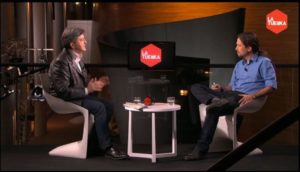
What I think is important, and what we did in our show Esprit de Campagne [‘The Spirit of the Campaign’], was to appropriate popular codes, those that you can find in TV series and news, to turn them against the system. This is the most important dimension, and it comes from Spain. Podemos has done a lot of work on this. For instance, we could imagine a ‘House of Cards’ style of TV show in which we would be in power and in which we would be confronted with the events of the real world, thereby appearing as a kind of dynamic shadow cabinet.
From that perspective, all our work on social networks is linked to the idea that we do not want to remain amongst ourselves, with the petty content of knowing French legislation better than anyone else. No, we want to use codes of communication which allow everyone to feel involved, so that our message can make sense for people.
LVSL: What was the media strategy of La France Insoumise during the presidential campaign?
Our purpose was to find an answer to our marginal position in mainstream media. To that end, we released two different TV shows. The first one, Pas vu à la télé [Not seen on TV], aimed to highlight the work of people who are never invited on television, people who are fighting against police discrimination, or people who are fighting for the right to die in dignity, people who are involved in the fight for a fairer society, etc. We decided that if mainstream media did not want to talk about these people, then we would.
The second show was the Revue de la semaine [Weekly Review], which emphasised the importance of topics which are overlooked by mainstream media. This allowed us to talk about the themes we wanted to deal with. As the running time of Pas vu à la télé was a little too long to work online, younger members of our team initiated a shorter show, better suited for the Youtube format. We decided to use the codes of the most popular Youtubers. We were advised not to look for something over aestheticised, since that is not always the most efficient way to make a successful video. That is true for videos, but also for visuals we publish on social media: the most beautiful ones are not necessarily those that work the best in the end.
LVSL: A lot has been said about the staging of Jean-Luc Mélenchon’s ‘character’ during the campaign…
Yes, that is another dimension to the campaign which went beyond the use of social media. What type of character would Jean-Luc Mélenchon embody during the presidential campaign? In 2012, he was the one who had to kick doors open. That strategy received a lot of criticism, but it is always easy to criticise past decisions a posteriori. Back then, it was something that we had thought through and carefully planned. In 2017, however, we could not repeat the same plan. Jean-Luc Mélenchon was already well-known and he did not need to kick doors open any longer. Quite the opposite, we had to establish Mélenchon as a credible figure. As a joke, we called him ‘the people’s good teacher’.
‘When we prepared for TV debates, we wanted Jean-Luc Mélenchon to take the high ground, to remain above the fray, to express his views in the interest of both the country and the people.’
Mélenchon was meant to embody a reassuring public figure. When we prepared for the two main TV debates of the campaign, we wanted Mélenchon to take the high ground, to remain above the fray, to express his views in the interest of both the country and the people. Even if that meant that he had to lecture everybody, we wanted him to show that he had mastered complex issues, and that his sense of humanity did not mean that he was not serious or credible. It worked in the debates, together with Mélenchon’s use of humour, which we don’t mention often enough. Humour is very important in politics. His little joke, ‘Well it was time there were some kind of debate withtin the Socialist Party,’ had a very positive impact [the Socialist Party was in government at the time of the election, and two former ministers of that same government, M. Macron and M. Hamon, were running for President on different political platforms].
LVSL: How far did you manage to establish La France Insoumise as a credible, alternative force?
That work still remains to be done, I am not sure that we have managed to do that yet. I have no regrets about the campaign, but clearly this is the area where we have not reached our goals. It might be why we fell short of victory: people tended to agree with our platform, but they were still scared. At the same time, we wanted to radically transform society. Of course, if you don’t want to scare anyone, all you have to do is say that you’re not going to change anything. There needs to be some compromise, because little by little communication ends up taking over, and you get rid of anything conflictual and you fail to change anything.
During the campaign, we decided to focus everything on the manifesto, although that is not always what candidates do during elections. Some campaigns are defined by a precise strategy or by a political line. Ours was defined by an online manifesto into which we put a lot of effort. We made the manifesto public in December, and then we released campaign booklets on specific issues. It was a way to show that we had the most detailed manifesto, and that it was serious and reasonable. When working on the manifesto, we got rid of that far left flaw which consists in understanding a manifesto like a shopping basket. We made sure to keep a good credibility level.
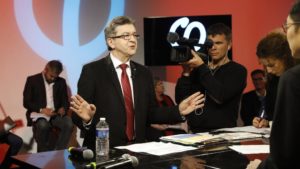
Then we published our manifesto as a book, L’Avenir en commun [The Future in Common]. We ensured it had a wide circulation and we organised two online shows about it. The show about our budget was a high point in the process of gaining credibility. We erred away from any polemical situations. We used humour and derision, which is a good way to avoid being seen as marginals —because you are seen as marginals if you play the part of the angry trade unionist.
Again, not everything was thought ahead, and we learnt from our mistakes as time went by. Considering the current situation, I think we have done a pretty good job to give credibility to our movement. Now, we need to carry on and go further.
LVSL: How do you plan to do this in the future?
First, we shouldn’t be afraid of being the official opposition. We shouldn’t hide from it. Some of our friends say “no, we are not the official opposition; we are the alternative.” I agree that we are the alternative, but we should not be afraid to take on the responsibilities which are ours, and those responsibilities involve opposing the nasty projects coming from Macron’s government. But of course, we have to do more than that.
In Parliament, for instance, when we oppose a bill, we should always put forward an alternative bill. The rules of the Assembly do not always allow us to do so, but there is nothing to prevent us from organising a press conference with our MPs to explain what we would have done instead of the government. There are communication tools which could allow us to show what we would do if we were in power.
There is also an aspect which is less to do with communication, and more to do with grassroots activism. Indeed, it is not enough to have both a good manifesto and a good programme, we must also be active within society. Our debates today are about self-organisation, about the ways in which La France Insoumise can be a tool of emancipation for the people. During our summer conferences, we had workshops on the forms of self-organisation which already exist in Marseilles, such as the auto-organised collection of waste, which in some areas is not properly handled by the council. Other people organise to ensure the safety of their neighbourhood, but in more intelligent ways than the far right does. This is probably all very embryonic, but it is a wonderful source of inspiration.
‘Our alternative will be meaningful if it is porous with society and if it comes to terms with elitist activist codes (…). We are trying to create the emergence of an alternative order.’
This must be understood in relation to the credibility issue. For instance, say people have a housing problem and start coming together; if their first reflex is to come and see us to know how we can help, then that will mean we have become credible to solve concrete problems. Solving problems is not just about national communication. Every day, locally, when someone’s in trouble, we need to be there to help.
I’m linking this to what I previously said about the porosity between our movement and society. This is not about gathering a little group of people in the corner of a room, isolated from the rest of society and happy to share the same codes. Our alternative will be meaningful if it is porous with society and if it comes to terms with elitist activist codes. Our space is meant to incorporate more and more people, not create barriers between them. We are trying to create the emergence of an alternative order.
LVSL: Earlier, you mentioned the works of Ernesto Laclau and Chantal Mouffe. To what extent did their works influence your approach?
Indeed, it was not all intuition, and that is a good thing too. That is why we had days just like today, when we’d be thinking about theory. Sometimes, signals that we get from society are not ripe enough for us to understand that it corresponds to a certain theory, and we only realise it a posteriori. It is exactly what I was saying about the word ‘Insoumis’ – it was only with practice that we understood the impact it could have. I do not believe in the idea that theory comes before practice – that is way too simplistic. I believe that there is a constant dialectical relationship between theory and practice. We had theoretical groundings when we launched our campaign, but what we learnt on the field also impacted the campaign. You cannot just indulge in applying a theory, because if society does not react the way you expect, then you are heading into a wall.
Of course we are intellectually indebted, not only to populist thinkers like Laclau & Mouffe, but also to Marxism, and to the fundamental ideas of political environmentalism. To come back to the campaign, we had indeed worked on Laclau and Mouffe, among others. This does not mean that everyone agrees within our team with the theories of Chantal Mouffe and Ernesto Laclau. Not everyone in the team has the same connection to Laclau. Personally, I am one of those who is the most inspired by him, but there are others who would rather distance themselves from him. We find our inspiration in principles, rather, because some aspects of their works are very theoretical, and we are more focused on how to apply things concretely.
Concerning the implementation of ideas and principles, Laclau’s concept of ‘transversality’ and of ‘the mobilisation of affects’ becomes very important. The main source of inspiration in populist theory is the critique of dogmatic Marxism which permeates many radical leftist groups. When I began my life as an activist, not that long ago, I took classes about materialism. I am a scientist, and my first reaction was: ‘but if the revolution is bound to happen because of the development of productive forces, then why are we doing all of this?’ I had a purely determinist vision of the Marxist approach, in which everything is supposed to happen along predefined lines. And then, I discovered Gramsci, with his contradictions, and then came Laclau and Mouffe, who taught us not to see things in a deterministic way.
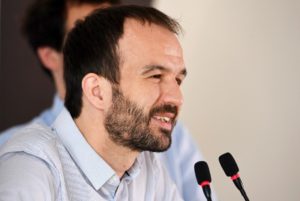
It is not enough that people agree 100% with our manifesto for them to vote for us. Emotions, atmospheres and collective dynamics also count in a political campaign. We planned several sequences of events for our campaign, each sequence was concluded by a great popular rally. As events went by, numbers were supposed to get more numerous. Our first leap of faith was the Stalingrad meeting in June 2016. Then, the Lille convention in October 2016 to make people understand that we were creating a new political object. And then came the 18th of March, with the meeting at Place de la République. There, this was about much more than our manifesto: we had to create an atmosphere, something cheerful. I was very glad when I saw that the word most often associated with our campaign was ‘happiness’. It is an affect, it means that we have passed on a message, and that people were smiling in our meetings. This dimension of populism, in my opinion, is very important.
The notion of a conflictual ‘border’ against our opponents was also essential. It is a classic notion that we had already developed before the campaign, but we kept naming our enemies to display our opposition to the oligarchy. We are talking to the population as a whole, including people who, traditionally, do not vote for us. It was funny, because a lot of people told us that their grandparents, who traditionally sided with conservatives, had voted Mélenchon for the first time. That is amazing. Some of us are wondering if this is what really made this campaign work. I believe it is, and it is not lying to say that we have cut into electoral areas which traditionally were not favourable to us. It is a dimension that can be considered as a benefit of the populist strategy.
‘From populist theories, I would retain the following concepts: transversality, defining with a conflictual border, mobilising affects, talking about subjects that are not usually talked about.’
Then, one should define what ‘populism’ means, because there are many populist theories. In our team, Benoit Schneckenburger has written a book on populism. Laclau and Mouffe are interesting, and Chantal Mouffe was there at our summer conference. Populism, however, is not limited to their works.
I would retain the following elements from populist thinkers: transversality, defining ourselves with a conflictual border against our enemies, mobilising affects, talking about subjects that are not usually talked about. When we make ours the vegan issue, or that of animal rights, this is transversality. Same thing when we publish a booklet on terrorism and talk about the army: people were not expecting us on those subjects.
LVSL: A central dimension of the campaign involved distancing yourselves from the traditional codes of the radical left. You mentioned Laclau’s ‘floating signifiers’: how did you come to adopt discursive elements which differed from those of 2012?
At the beginning of the campaign, we realised that all our vocabulary had been stolen, and that we did not know which words to use anymore. The debate about words can become irritating when it comes to whether we should use the word ‘left’ or not. Between ourselves there is no doubt: we all think of ourselves as left-wingers. But the very word ‘left’ has been stolen from us. It is difficult today to talk about the left, or socialism, or communism, even if those are beautiful words. As for progressivism, it was stolen from us by Macron. Even the fascists are starting to steal our words and symbols, such as patriotism. Les Républicains [France’s main right-wing party] have hijacked the Republic. This means we have to invent new words, and this issue is far from being settled.
We could talk about a ‘green and social opposition’, but we are not only an opposition. We could talk about ‘social and environmental humanism’, but that sounds a little too long. Maybe the word ‘Insoumis’ is the right one, because it is the word that resonates most in society. There is a lot of debate and there are a lot of questions that we are asking ourselves about those issues. Ecosocialism was a beautiful word, but try and talk about socialism today…
LVSL: Shouldn’t ‘progressivism’ be taken back from Macron so as to avoid being dismissed by the catch-it-all ‘conservative’ category he is trying to build against both the left and the right?
Yes, he has already started doing it. When he explains that ‘the French don’t like reforms’, for example. It is Sarkozy’s rhetoric, and it needs to be taken down. It is a beautiful construction, by the way. He has created a contradiction within society between those who favour his reforms and those who favour maintaining the status quo. But we are not for the status quo, there are 300 propositions in our political manifesto.
LVSL: In your meetings, the most common slogan is ‘Resistance’, which in a way shows the persistence of a defensive position…
Yes, but the problem is that we have not found anything else, and those things do not just happen on their own. During the campaign, we also chanted ‘Dégagez!’ [Clear off!]. There again, you cannot pretend that there is no link between 2012 and 2017. All of the first part of our long history, is the creation of a protest space, on which some wider fields have later developed. ‘Resistance’ is something we inherited from 2012 and people have grown fond of it. That is how I see it.
LVSL: Can it be said that what is at stake in the next few years is passing from a logic of resistance to showing that it is possible to take power and do things differently?
If victory boiled down to slogans, we would have taken power in this country a long time ago. It is not enough to change our slogans, even though they do have their importance and they participate in the making of our history. In Spain, Iñigo Errejón insists a lot on the role of local elections. For us, the first confrontation with the government will be during the European elections. It won’t be easy, but it will be a national-scale confrontation with the government. Local elections are a little different, because outcomes are not always determined by the national context.
Besides, we shouldn’t completely abandon the war of movement in the name of a war of position… You can always try and build your credibility by erasing conflictuality or making compromises. But you can also consider that your credibility will appear through the failure of others. You need to be careful about what you do, because people are angry. The slogan ‘Resistance’ in our meetings might not be the most appropriate, but the slogan of Podemos in June 2016, ‘the smile of a country’ did not express enough anger.
Whilst we do not want to be seen as firebrands who are always shouting and never happy, we cannot act as if everything was fine in a wonderful country. There are problems in this country, there is anger, there are people who are annoyed, who are fed up. We also have to speak to them. I would not like it if, in the name of credibility, we opted for a nice soft strategy that only spoke to urban electorates. There is anger in this country.
LVSL: What do you contemplate for the future of the movement, in terms of both organisation and structure?
We have launched a suggestion box to get ideas from people registered online. Personally, I am radically opposed to a structure based on local branches with federal secretaries at the top of that organisation. This would lead us two years back in the past. It does not mean that we should not pay attention to the local scale. But I am opposed to the elaboration of a local structure which would transform everything into a power struggle and direct the activity of the movement toward the inside instead of the outside. This is precisely what creates the absence of porosity between the movement and the rest of society: you end up with internal rivalries whilst the rest of the world moves on.
I think that one of the strengths of France Insoumise during the 2017 campaign was how easy it was to get involved: you just had to come and say what you wanted to do, and in less than twenty minutes you could become part of the movement. And it is not just that you became part of it in a formal way, but you did so through action. It is action that federates. A second great strength has been the multiplicity of the forms and rhythms of involvement and of the methods that people used. If you don’t usually have time because you work or you take care of your family, but if ever you find yourself with two hours of free time, you can use them by phoning voters to try and convince them. Or, instead, if you are free three days a week because you work part-time, then you can participate in one of our caravan tours in local neighbourhoods. Every single person, with their experience, their skills, their accomplishments and their wishes can add their contribution to our work. The movement federates through action and through common objectives, our political platform being the central objective around which everyone is gathered.
There is a third point: this is a movement turned toward action and not toward theoretical discussions. Not that we shouldn’t have theoretical debates. We do have them, as you can see with this interview and with the debates we have organised over the summer. But it is always with the intention of articulating theory and practical experience. We work towards a better understanding of the world in order to transform it, and to transform it in order to better understand it. I do not look down on think tanks, but it just isn’t what we are trying to build here. We want our online platform to allow for fluidity in the actions undertaken, but we also want to create a multiplicity of meeting points with particular areas of society, a bit like a movement with many heads.
We could have spaces specifically designed for trade unionists, others for elected representatives, others for environmentalists, and all of those spaces would contribute to the same purpose with a certain degree of autonomy for each group. Our movement must slide into every single nook and cranny of society. For example, some of our friends told us that we should not ignore the radicality of green activism. But if you tell people in ZAD [Zone à défendre, or ‘Defense zone’: an area with a militant occupation opposing a development project] to join La France Insoumise, well, it’s just not their thing. We could try to build a dedicated space or meeting point between them and us; we could help them and they too could bring us a lot. I think every local action must be supported and financed: if a support group wants to start a campaign against the closure of a public service in their locality, they should count on the help of our national platform online.
The last dimension concerns self-organisation, although much remains to be done. Sometimes we get it wrong. In my support group, we have tried several things out and we have come to realise that we were wrong to think on behalf of people: we are not service providers, we cannot just go to local neighbourhoods and start imposing things, and we are not commercial representatives either. So we changed our approach, we tried to create spaces of discussion in our local neighbourhoods so that communities themselves could set their claims and self-organise. We are definitely not going to do it for them, we are going to let them do it and we will be there as something they can lean on if needs be. So we are thinking of hiring venues in big cities where it is possible to experiment such practices, a little bit like what Podemos is doing.
LVSL: Can this method prove long-lasting now that we are entering a colder phase politically? Do you think that the Insoumis will stay mobilised?
Of course there are people who were very mobilised during the campaign and who will be less so tomorrow, but the whole point is to know to what extent this will be true. I believe, and our summer conference bear witness to it, that there is a certain frustration not to have won, but also, and above all, the feeling that we have paved the way for next time. People are enthusiastic and willing to conquer. We have a central position in society, and people are interested in what we are doing. The results we got in these elections are also full of potential. Our results in the poorest neighbourhoods of big cities are extraordinary. People are really looking forward to seeing us in power, and we could feel it over the summer [2017] when touring the country: people told us “at least, you guys are coming back, you haven’t abandoned us.” As a political activist, when you hear something like that, you often come back, because you feel like there is responsibility on your shoulders.
‘Our results in the poorest neighbourhoods of big cities are extraordinary. People are really looking forward to seeing us in power, and we could feel it over the summer when touring the country.’
I am not saying that all 500 000 people who have registered on our online platform will remain active – if that were the case, we’d be able to counter-attack against he government very easily. But something is growing; something is born out of our campaigns. All of this will not be easy, as we saw already with Parliamentary Elections. We lost votes. But actually, I understand those people who did not go out to vote again: we have campaigned on the idea that we needed to move on to a 6th Republic, and that we needed to win the Presidential election in order to do so. Once the presidential election was over, we explained that Parliament could enable us to slow down Macron. People vote for their problems to be solved, not to bother the guy who won the presidential election.
LVSL: How is La France Insoumise planning to fight against the Front National [Marine Le Pen’s far-right party]?
First, we take into account people’s problems and the misery they are faced with. It is not very original, but it is essential. We are not scared to deal with slippery issues, like posted workers. Secondly, we refuse to leave certain issues, such as religion or security, to the far right. At some point in the past, we managed to let ourselves be trapped in the idea that we were not concerned by matters of security. But who are the first victims of security issues? Not the bourgeoisie from rich areas of Paris. People often mention violence in poorer neighbourhoods: well, the first victims of that violence are those very communities.
We should not leave such themes to the National Front, nor should we abandon symbols such as the flag and the Marseillaise. If anything has changed during our campaign, this is it. And not only in our campaign, but in the whole country: people were proud of carrying the blue-white-and-red flag. It is a collective phenomenon: when everybody starts carrying the flag, you start thinking “I am no different, I too can carry it.” When only the fascists carry the flag, you easily start thinking “I shouldn’t do the same, or I’ll be associated with those people.”
‘We should not leave those themes to the National Front, nor should we abandon symbols such as the flag or the national anthem (…) Talking about your country does not make you a nationalist.’
We must raise the issue of Europe. Maybe it did cost us some votes. Every upper middle class person I meet tells me that we could have won if we had been less critical on the question of Europe. But I also know many people who would not have voted for us if we had. We need to work on this: it is not so much a problem of radicality as one of precision regarding the way we formulate our views on such topics. One thing is sure, we should not leave the National Front with a monopoly on the EU and economic protectionism.
We should not let ourselves be poisoned by a movement which believes that everything depends on the international scale and nations cannot change people’s lives anymore. I believe in the exact opposite. I respect that state of mind but we think that power must be taken within the frame of the nation. Of course we need to work with other countries, but it is first in our country that we want to take power. And talking about your country does not make you a nationalist.
It is the same with the question of secularism. Some movements on the left have done stupid things – they have considered for example, and that is insulting for everyone, that there was no progress possible in poorer neighbourhoods unless we compromised with religious questions. That amounts to thinking that people in poorer neighbourhoods are determined by their religion, which is absurd. Some have a religion, which is all very well – they have a right to have one. But let us not act that stupidly, for this is what lay the ground for the National Front.
And one last thing, we need to stop demonising the National Front. That actually makes them stronger. Every time you tell Marine Le Pen that she is the devil, people want to vote for the devil, because those who are presented as paradise officiers offer a paradise which does not suit them.
Photo credits:
http://www.manuelbompard.fr
http://www.publico.es/publico-tv/otra-vuelta-de-tuerka/490285/otra-vuelta-de-tuerka-jean-luc-melenchon
https://www.rts.ch/info/monde/8547421-francois-hollande-doute-de-la-capacite-a-gouverner-de-jean-luc-melenchon.html
http://www.liberation.fr/france/2017/08/24/la-france-insoumise-ouvre-ses-premieres-journees-d-ete-a-marseille_1591761
http://www.rfi.fr/france/20170219-presidentielle-2017-jean-luc-melenchon-chiffre-son-programme


